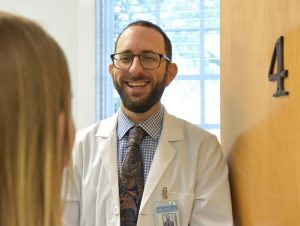Philip Griffin, AuD, successfully advocated for the change and says the passage of the audiology assistant rule in North Carolina dovetails with a need for high-quality patient care.

Philip Griffin (’07 AuD), an audiologist at the UNC Hearing and Communication Center, successfully advocated for statewide clarification for the role of audiologist assistant, which will allow for limited telehealth opportunities during the COVID-19 pandemic.
Griffin, an assistant professor in the Division of Speech and Hearing Sciences, also serves as legislative chairperson of the North Carolina Audiology Association (NCAA), where he is also past president.
“Audiology is a small field,” Griffin said. “For us to get in there and see some action around this—it was really gratifying.”
Griffin said the role of audiology assistant has not been historically recognized as an occupation, but people have decided to pursue the career. As a result, training programs for audiologist assistants have launched over time. Griffin said some other health care professions have assistants and that the passage of the audiology assistant rule in North Carolina dovetails with a need for high-quality patient care.
“This seems to be the direction health care is going in—to try and see more patients, to see them safer, to give them more time with the provider, all at a lower cost,” Griffin said.
Audiology assistants could play a role in lowering the barrier of access to hearing care, such as obtaining a hearing aid, especially as the Baby Boomer generation begins to age.
The rule will allow for an audiologist assistant to register under an audiologist’s name as their assistant. The audiologist would be responsible for patient care.
“It’s higher-quality care under the care of an audiologist but at a lower cost,” Griffin said. “It’s the best of both worlds.”
Griffin is also working alongside the NCAA to pass an interstate compact, which would allow for audiologists within agreeing states to allow for practice within the boundaries of states in agreement of a compact. Currently, audiologists cannot practice across state lines and must be re-licensed in order to do so.
“If I have a patient who comes in from West Virginia, I can’t legally do a telehealth appointment with that patient,” Griffin said. Griffin explained that this can affect patient populations who live in cities or towns that border state lines.
“This would be huge for telehealth,” Griffin said.
During the COVID-19 pandemic, Griffin said being able to practice among agreeing states would be beneficial. Additionally, an interstate compact would be beneficial when pandemic restrictions begin to loosen. As an example, Griffin said those in the military who have a partner in audiology would have to re-register their audiology license in a new state if they had to relocate, which could provide job security strain.
Griffin said the pandemic has brought a renewed importance to pass the interstate compact, a move which West Virginia and other states have already approved.
“COVID has pushed up the need for a deadline on this,” Griffin said. “It’s more urgent.”
Philip Griffin ’07, AuD, also specializes in dizziness assessment and treatment and is a fellow in the American Academy of Audiology. The Doctor of Audiology program is ranked #5 in the country, according to U.S. News & World Report.